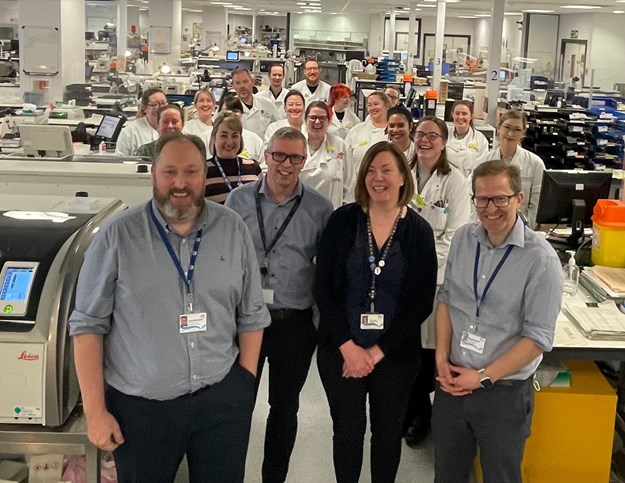Award joy for iCAIRD and NHSGGC Biomedical Science team
NHS Greater Glasgow and Clyde’s Biomedical Science team have been recognised, alongside West of Scotland Innovation Hub colleagues iCAIRD, for their work to digitise lab processes and validate AI within pathology.
Both teams were awarded with the Improvement in Action Award at the Chief Health Science Officer Awards last week, for their collaborative work which is helping to transform the Pathology Lab at Queen Elizabeth University Hospital.
Before the programme started, teams in the lab processed each slide manually. But following the success of the digitisation project, they are now processing around 50,000 slide images per month and have developed an archive of over 1.5million secure anonymised images which can be utilised for further research and AI learning, to continue to improve the patient experience.

Dr Gareth Bryson, Pathologist and Clinical Director for Laboratory Medicine for NHSGGC and said: “It’s really important for the entire team to be recognised for the work that they have done taking our lab through to full digitisation, which is putting in the building blocks in place for us implementing AI to improve patient care in the future.
“We started with a few thousand slides and we have grown to around 50,000 being processed each month. Each of these glass slides needs to be optimised for digitisation and placed in digital scanners that then produce these digital images. It’s a huge amount of work and a big undertaking for the lab, who have been so successful in delivering this.
“By working digitally we’re able to improve our workflow in terms of distribution of cases amongst pathologists within the department and it provides specimen tracking right through to the reporting stage. So this actually improves patient safety and we are now beginning to validate and test AI products that will assist pathologists in coming to the correct diagnosis for patients even more efficiently.”
Morag McNulty, Specialty Manager in Core Histology for NHSGGC, said: “We’re all very proud to have been recognised with this award, a lot of work has gone into this to make it possible, having to adapt and amend how we work. So it’s a huge pleasure to get that recognition.
“We are currently in the middle of changing our work flow to use the system in place of a traditional microscope for examining the quality of the slides we produce. The team here are really proud of what they do and the work they do for the patients, so are delighted to be recognised in this way.”
Processing tissue for microscopic examination involves tissue being processed to wax, cutting thin sections onto glass slides, staining them and examining them under a microscope. All of these slides have to be put into order and sorted into cases.
The move towards doing this digitally will streamline the process. It will reduce manual sorting of slides into cases and also the retrieval of physical slides from archive where required. It will allow consultants to report remotely where they cannot be on site.
James Blackwood, iCAIRD Programme Manager, said: “I think this is fantastic recognition from their peers, of everything the biomedical science team has achieved. This national award shows that health scientists really are the core of digital pathology.
“I’m really pleased because they have worked tirelessly to make iCAIRD’s digital pathology workstream a success and it’s fantastic to see them as a team receive this award.
“When you digitise the process, you turn tissue into data that can be accessed from anywhere. That builds greater resilience into the diagnostic service by allowing our pathologists to report from anywhere, and better collaboration and engagement with clinical colleagues across Scotland. More importantly, it creates new opportunities for laboratory medicine at NHS GGC to participate in research and innovation. As soon as you have data you can start to use automation, clinical decision support and artificial intelligence to make a tangible difference to the productivity and quality of outcomes from the pathology service.
“iCAIRD is one of the largest healthcare AI research programmes in the UK. We work with 40 partners to deliver 50 AI projects and we’ve build a database of over 1.5m digital pathology images that can be anonymised for research purposes. I think this award once again shows that iCAIRD is one of a small cohort of initiatives worldwide that has been able to achieve this scale of ambition.”